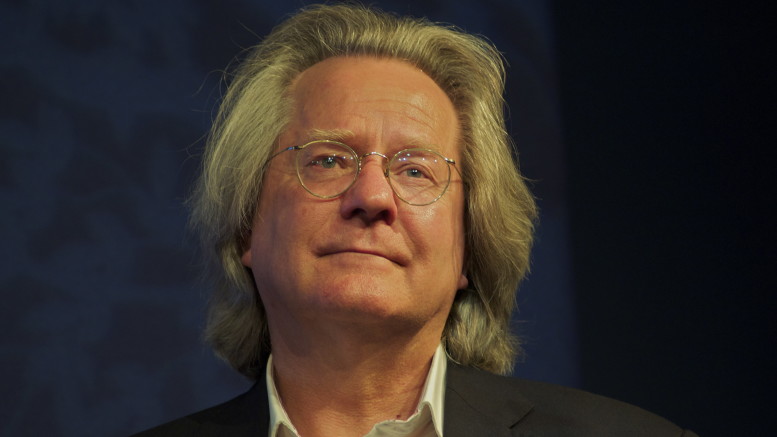Occasionally I’m lucky enough to be able to get to the Hay Festival and hear various authors, politicos and thinkers put their point of view or promote their latest book. I’ll be travelling down with friends to Hay a couple of times during this year’s festival in order to hear particular people speak. Therefore I thought that what I have heard may be good subjects for blog posts. It’s something I’ve done before when I published a couple of stories in 2014 on the EU parliamentary elections and on PJ O’Rouke, which were based on sessions I attended there.
Now for those who have never attended Hay some information. Although it is a festival that promotes itself as ‘imagining the world’, the Hay world-view that it imagines is very much Left of centre. However there are some interesting speakers there talking about interesting books even though I may dislike the politics of the event, or even of some particular speakers. I think that Hay does need to broaden out the sort of views that it hosts and I think a few less Lefty luvvies and a few more speakers like Christiana Hoff-Sommers, Ben Shapiro, Thomas Sowell, Tammy Bruce, Tommy Robinson and others, would liven up the intellectual mix there and help stop the event morphing totally into a left wing circle jerk, something it is in danger of becoming. As someone who believes in the value of books and the life of the mind it would be good to see Hay broaden its appeal and its outlook. If it is going to continue to be the ‘Woodstock of the Mind’ then it needs to acknowledge that there is plurality of opinion out there, and that it may be excluding some important currents of thought.
If people are going to attend Hay either this year or in other years I’d like to give you some tips for surviving the Hay festival. Firstly take your own food and drink. Prices in the eateries and the bars there are astonishingly high and the shops in the town of Hay itself seem to ramp up their prices for food etc during the festival. I don’t blame them for wanting to make a profit but food and drink prices there are an issue. £5 for a pint or the same for a posh pastie is too much. Secondly if you are a parent there’s not much there for the under threes. Over threes fine, but for the tiny ones, not so fine. Thirdly, don’t spend all your time on the festival site. Do go check out the masses of second hand bookshops in Hay, they are a revelation.
Now onto my post about the first session I attended, that by the philosopher AC Grayling who was talking about his book ‘The Age of Genius’.
‘The Age of Genius’ is about the massive intellectual changes and changes in world view that occurred between the 17th and 18th centuries in Europe. Mr Grayling started off by saying that his latest book was, for reviewers, a bit of a ‘Marmite’ book, those who have read it have either loved it or hated it. He said that those historians who take an ‘archival’ cold facts view of history hate it but those whose speciality is the history of ideas, enjoyed it.
He started off by saying how much history writing prior to the First World War was narrative history, with historians seeing the world as progressing from the darkness of superstition into a world of light and knowledge. This type of history writing, said Mr Grayling, stopped when the world was faced with the effects of the ‘trainwreck’ that was the Great War. This war he said, changed people’s view of history and how it should be set out and studied. One of the effects of WW1 was the growth of post-modern relativism in history, where each and every culture’s historical narrative was equal to everyone else’s. Modern historical writing, Mr Grayling said, was devoid of any of the sorts of ‘grand narratives’ that had characterised history writing of the past. This backs up what I’ve said in the past which is that we, by which I mean the peoples of Europe, are still living with the after effects of WWI. We may not realise it but the effects of those four years of carnage are still with us in the effects that that military conflagration had on our societies. The names on the WWI memorials that are present up and down our lands are the names of people who left behind shattered families and shattered dreams. That sort of mass shock does something profound to a society. WWI laid the seeds for WWII which in turn led to the massive anti-democratic mistake which is supranationalism.
Mr Grayling used a couple of really great analogies to describe the revolutionary changes in thinking between 1600 and 1700. He said that it’s interesting to imagine what a person in 1600 would think when looking up at the sky and what someone in 1700 would think when they looked up. He said that the person from 1600 would see the stars as things put there for our amusement by a God who created an Earth-centred universe. By 1700, Mr Grayling said that the person looking up would have seen things much differently. That person would have seen the stars as faraway suns that might, just might have planets orbiting them. The 1700 viewer would also have accepted that the universe was not Earth-centric but that our solar system was just one tiny part of a vast universe that defied a Judeo-Christian religious explanation.
Behind those changes in mindset said Mr Grayling, were massive social and political changes caused in part by the Thirty Years War and a desire for greater knowledge and greater freedoms. Mr Grayling said that the Thirty Years War, of which the Defenestration of Prague was a key point in its start, devastated parts of Europe terribly. He added that some areas of German speaking Europe were wastelands for a generation following the war. There were parts of German speaking lands where 1 in 3 of the inhabitants had been killed during the Thirty Years War. Whole towns and cities were razed to the ground and the most appalling atrocities were committed during the fighting. However, what the devastation of the war also did was to break down borders at a time when postal services were improving. This meant that thinkers were not as silo-like as they had been in the past. Ideas travelled back and forth across Europe and fed into yet more new ideas.
To give some idea of the rapid pace of change that occurred in the period in question, Mr Grayling said that when Shakespeare’s Hamlet was first performed in 1602 the idea of killing a king was shocking, something considered not just as murder but, because Kings were presumed to be anointed by God, as blasphemy. If you go forward just a few decades to 1649 then you have the Commonwealth, Britain’s only attempt at being a republic, executing King Charles I outside the Banqueting House in London. England during this period had gone from considering it blasphemous to harm a monarch to killing one in public. This represents a huge change in mindset.
The period between 1600 and 1700 was one which, at the beginning, saw people burned at the stake by the Roman Catholic church for questioning the idea of an Earth-centred universe and preferring instead the view of Nicolaus Copernicus. His was one giant leap towards modern astronomy by declaring that the sun was centre of the universe and the Earth revolved around the sun. The 1600’s saw people killed by the Church for professing Copernican views. The century ended in a period where the right of free enquiry started to be established and where the beginnings of modern science can be traced to. Mr Grayling said that the Catholic church’s attack on Galileo Galilei and the forced recantation of sun-centrism by him under threat of death, was ‘the last throw of the dice’ by the Catholic Church for control of people’s thoughts. I liked his description of Sir Isaac Newton very much. He quite fairly described him as ‘a nutcase’. This is because although Newton is known for his mathematics work and work on gravity, much of his life was spend on ‘non-science’ stuff such as alchemy and trying to decipher codes allegedly in the Bible. His description of Newton was quite accurate as Newton was not alone in his esoteric studies and it was time when alchemy and chemistry existed side by side, a time before our one where we know that alchemy is bunk because chemistry has proved to us that alchemy is bunk.
If there was one disappointment to the whole hour long talk then it was occurred in the Q and A. AC Grayling declared himself in favour of remaining in the European Union. This was met by much applause from what I took to be the more Leftist portions of the audience, although it must be said, not by the entire audience. Mr Grayling said that he was in favour of remaining in the EU because he wants to be part of a continent that created Beethoven. It would be helpful to remind Mr Grayling that we will still have Beethoven and access to all the interesting thought that goes on and the ideas that are created, even if we are to exist outside of the EU. It may even come to pass that any future implosion of the EU will, like the aforementioned Thirty Years War, give birth to another ‘age of genius’, when previously strongly held views on things like internationalism and multiculturalism are discarded in favour of something else. A break up of Europe’s supranational organisations may also aid creativity with a multitude of different sources of artistic patronage springing up to replace centralised EU ones or nominally national or local ones that are underpinned with EU cash. The current situation means that the artworks produced by those in receipt of EU cash have to reflect a view that is ‘EU approved’. That is a situation that is grossly opposite to creativity. A Europe where the Poles, the Germans, the Italians, the British and others should produce the art that reflects their cultures, and not have to pump out some flaccid, vacuous ‘euroart’, is to me more in keeping with the concept of creative freedom. A nationalist Europe doesn’t have to mean war or the stifling of creativity, it could produce quite the opposite effect.
Apart from the, to me, sour, pro-EU note, this was a fabulous, gripping and informative talk given by someone who although their politics is opposite to mine nevertheless knows and loves their chosen subjects. Having read AC Grayling’s book ‘Liberty In The Age Of Terror’ I knew that I was in for a fact filled, challenging and stimulating lecture and I was not at all disappointed. It’s one of those lectures that has inspired me to learn more about this fascinating period in Europe’s history.





